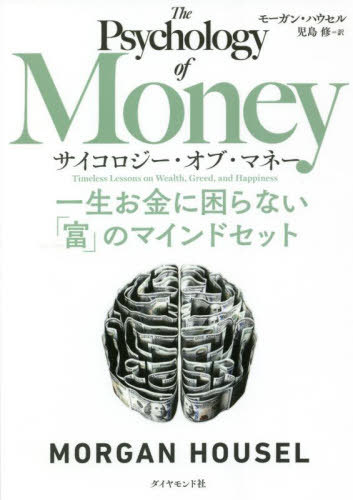Introduction
The idea that “having money makes you happy” is something many people intuitively believe. We tend to think that as our income increases, we can live better lives and become more fulfilled mentally. However, a large-scale study by psychologist Daniel Kahneman and economist Angus Deaton shows that the relationship between happiness and money is not as simple as we might expect.
This study analyzed the link between income and happiness in over 450,000 Americans. It revealed that happiness has two distinct aspects: “emotional well-being” and “life evaluation,” and money affects these two differently.
In this article, I will explain these findings in an easy-to-understand way and discuss how they can be applied to modern wealth building and life planning.
- Happiness Has Two Different Aspects
- The Relationship Between Income and Happiness: The ,000 “Threshold”
- Why Does Emotional Well-being Plateau at a Certain Income?
- The Struggles of Low-Income Groups Are More Severe
- The Importance of Wealth Building: Why Increasing Income Alone Doesn’t Boost Happiness Much
- Other Factors Influencing Happiness Beyond Income
- Summary and Tips for Future Wealth Building
- References
Happiness Has Two Different Aspects
First, happiness is not a single, simple concept. We can broadly divide it into two types.
Emotional Well-being
This refers to the quality of emotions we experience in daily life — for example, how much we laughed yesterday or how much stress and sadness we felt. Emotional well-being is the accumulation of daily experiences, measured by the frequency and intensity of feelings like joy, sadness, anger, and so on.
Life Evaluation
On the other hand, life evaluation refers to the satisfaction one feels when reflecting on their life as a whole. It is often measured by surveys asking questions like, “On a scale of 1 to 10, how satisfied are you with your life?” This is a more rational assessment of one’s entire life.
The Relationship Between Income and Happiness: The ,000 “Threshold”
Research shows that increasing income does affect happiness, but the effect varies greatly depending on how much income one has.
Emotional well-being rises up to about ,000
Up to an annual income of approximately $75,000 (about 8 million yen in Japan), both emotional well-being and life evaluation tend to increase as income rises. This is because moving from a state lacking essentials to stable and comfortable living reduces stress and increases enjoyable experiences.
Emotional well-being plateaus beyond ,000
However, once income exceeds $75,000, emotional well-being largely plateaus. That means that earning more than this amount doesn’t significantly increase daily joy or reduce stress.
Life evaluation continues to increase with income
In contrast, life evaluation (how people assess their lives) keeps rising as income increases. This is likely because higher income correlates with feelings of success, social status, and accomplishment.
Why Does Emotional Well-being Plateau at a Certain Income?
There are several reasons behind this intriguing phenomenon:
- Basic needs fulfillment:
An income of $75,000 roughly covers essential living costs in the U.S., such as housing, food, healthcare, and education. Beyond this, daily worries about basics decrease significantly. - Adaptation effect:
Humans are sensitive to changes but quickly adapt to new circumstances, causing initial joy to fade. Even if income rises, emotional pleasure tends not to last long. - New burdens arise:
Higher income and living standards can come with increased job responsibilities, complex lifestyles, and pressure, which can offset gains in emotional well-being. - Reduced ability to savor small pleasures:
Psychological research suggests that people with higher incomes may have a diminished capacity to enjoy small daily joys, as their satisfaction tends to focus more on material success.
The Struggles of Low-Income Groups Are More Severe
Conversely, the lower the income, the stronger the experience of stress, sadness, and hardship.
- Increase in negative emotions due to financial hardship:
Low income can worsen emotional pain caused by health problems, divorce, loneliness, and other difficulties. - Lack of buffers:
People with low income often lack time for rest, hobbies, or social interactions, increasing their mental burden.
The Importance of Wealth Building: Why Increasing Income Alone Doesn’t Boost Happiness Much
Let’s consider what this study suggests from a wealth-building perspective.
Many people assume that increasing income naturally leads to more wealth, but this isn’t always true.
- Raising lifestyle standards (social comparison):
When income rises, people tend to increase spending to match their peers, such as on housing, cars, clothes, and entertainment. This can leave little money “left in hand.” - Impact of assets on happiness:
Having solid assets provides mental peace and future security, improving life satisfaction. Without assets, even a high income can’t erase anxiety. - Risk of wasteful spending:
Higher income often leads to more wasteful spending, delaying asset accumulation.
Therefore, improving happiness requires not just increasing income but also intentionally saving assets and controlling lifestyle expenses.
Other Factors Influencing Happiness Beyond Income
The study also found that health, relationships, loneliness, and smoking status strongly affect daily emotional well-being.
- Health:
Chronic illnesses, headaches, and poor physical condition significantly reduce emotional well-being. - Social connections:
Loneliness increases stress and sadness, greatly harming happiness. - Daily rhythms:
Days off help reduce stress effectively. - Habits (like smoking):
Smoking is a strong negative factor for emotional well-being.
Thus, not only income but also health management and enriching social relationships are indispensable for maintaining happiness.
Summary and Tips for Future Wealth Building
From this research, we learn:
- Happiness rises with income up to about $75,000, after which emotional well-being plateaus.
- Life evaluation (self-assessment) increases proportionally with income, reflecting social status and a sense of achievement at higher incomes.
- Low income greatly reduces emotional well-being and amplifies suffering in difficult situations.
- Securing assets for future peace of mind is crucial, beyond just earning more.
- Non-monetary factors like health and social ties are key to emotional happiness.
When practicing wealth building, it is vital to not only increase income but also control living expenses, reduce wasteful spending, and prepare for the future. At the same time, maintaining healthy habits and good relationships is equally important.
References
Kahneman D, Deaton A. High income improves evaluation of life but not emotional well-being. Proc Natl Acad Sci U S A. 2010 Sep 7;107(38):16489-93.
Recommended Books for Readers Interested in This Topic
If you found this article interesting and want to understand the psychology behind money and happiness better, I recommend these books:
- “The Psychology of Money”
This book clearly explains our behaviors and emotions regarding money. It’s perfect for those interested in the psychological background of wealth building and consumption.

- “Tokyo Happy Life on a 900,000 Yen Annual Income”
Filled with tips on how to live happily with a small income, this book deepens the idea that money alone is not the measure of happiness.

Through these two books, you can deepen your understanding of the complex relationship between income and happiness.



コメント